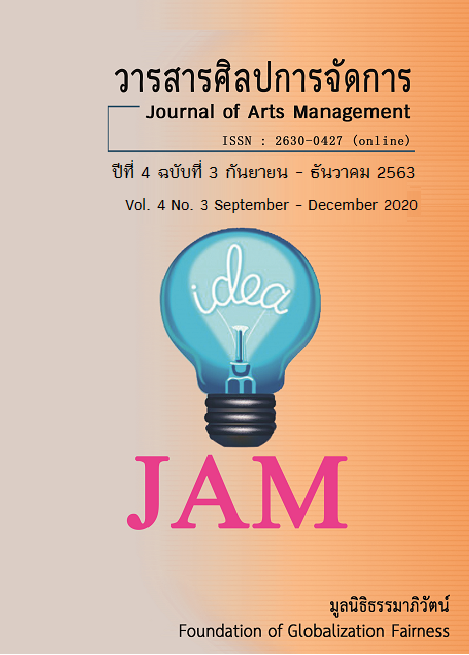Quality Leadership of Administrator and Cultural Performance in School Under Prachuapkhirikhan Primary Educational Service Area Office 2
Main Article Content
Abstract
The purpose of this study was to study the relationship between quality leadership of administrator and cultural performance in school under Prachuapkhirikhan Primary Educational Service Area Office 2. The sample group used in the study was 73 places under the Prachuap Khiri Khan Primary Education Service Area Office 2, and 2 informants each providing information for each school consisting of the school director or the deputy director of the school or government officials. 1 person and 1 teacher who taught in subjects related to art and culture, a total of 146 informants. The research instrument was a questionnaire about the Quality Leadership of Administrator the executives according to the concept of Sergiovanni and Cultural Performance in school use the manual of the cultural center network in the educational institutions Ministry of Culture. The statistics used for data analysis were frequency, percentage, mean, arithmetic mean, Standard deviation and the Pearson’s product-moment correlation coefficient analysis. The research results were as follows:
1. The qualitative leadership of executives under the Prachuap Khiri Khan Primary Education Service Area Office 2, in overall, the highest level When considered in each aspect at the highest level, 4 aspects and in 4 levels, in order of the highest arithmetic mean, as follows: The purpose was to have a tenure principle, basic necessity. governing principles personnel management, working principles, foresight, and sequential planning
- Cultural operations in educational institutions under the Prachuap Khiri Khan Primary Education Service Area Office 2, in general, it was at a high level when considered in each aspect, at the high level in all aspects in order by the arithmetic mean of descending as follows: cultural conservation, cultural revival, cultural development, cultural promotion, cultural enhancement work, cultural transfer event respectively, and cultural exchanges.
- The qualitative leadership of administrators and cultural Operations in schools under the Prachuap Khiri Khan Primary Education Service Area Office 2, in general, there was a moderate level of relationship. Statistically significant at 0.01 level.
Article Details
Views and opinions appearing in articles in the Journal of Arts of Management It is the responsibility of the author of the article. and does not constitute the view and responsibility of the editorial team I agree that the article is copyright of the Arts and Management Journal.
References
ประภาวรรณ ตระกูลเกษมสุข, อนุสรา สุวรรณวงศ์ และทินกฤตพัชร์ รุ่งเมือง. (2563). ความสัมพันธ์ระหว่างปัจจัยส่วนบุคคลของครูและบุคลากรทางการศึกษา กับการรับรู้ช่องทางการสื่อสารการตลาดของโรงเรียน. วารสารสหวิทยาการมนุษยศาสตร์และสังคมศาสตร์, 3(2), 129-143.
ปรีดา เหลือบแล, นงลักษณ์ ใจฉลาด และอนันต์ นามทองต้น. (2557). แนวทางการส่งเสริมการดำเนินงานด้านวัฒนธรรมของผู้บริหารสถานศึกษา สังกัดสำนักงานเขตพื้นที่การศึกษาประถมศึกษา จังหวัดตาก. วารสารวิชาการเครือข่ายบัณฑิตศึกษามหาวิทยาลัยราชภัฏ
ภาคเหนือ, 4(6), 27-40.
ปิยะ ละมูลมอญ. (2556). วัฒนธรรมองค์กรที่ส่งผลต่อการเป็นองค์การการเรียนรู้ของสถานศึกษา สังกัดสำนักงานเขตพื้นที่การศึกษาประถมศึกษาปทุมธานี เขต 1. (ปริญญาศึกษาศาสตรมหาบัณฑิต). มหาวิทยาลัยเทคโนโลยีราชมงคลธัญบุรี.
พรรณี แออ้อย. (2557). วัฒนธรรมองค์กรของโรงเรียนมัธยมศึกษา จังหวัดกระบี่. (ปริญญาครุศาสตรมหาบัณฑิต). มหาวิทยาลัยราชภัฏวไลอลงกรณ์.
พิชามญชุ์ ม่วงแก้ว. (2559). การศึกษาความสัมพันธ์ระหว่างภาวะผู้นำของผู้บริหารสถานศึกษากับการดำเนินงานระบบการดูแลช่วยเหลือนักเรียนในสถานศึกษา สังกัดสำนักงานเขตพื้นที่การศึกษาจันทบุรี. (ปริญญาครุศาสตร์มหาบัณฑิต สาขาวิชาการบริหารการศึกษา). มหาวิทยาลัยราชภัฏรำไพพรรณี.
ศศิรดา แพงไทย, สุบัน มุขธระโกษา และสมใจ มณีวงษ์. (2562). รูปแบบภาวะผู้นำเชิงสร้างสรรค์ของผู้บริหารสถานศึกษา สังกัดสำนักงานเขตพื้นที่การศึกษาประถมศึกษาขอนแก่น เขต 2. วารสารมหาจุฬานาครทรรศน์, 6(7), 3299-3313.
สำนักงานคณะกรรมการพัฒนาการเศรษฐกิจและสังคมแห่งชาติ สำนักนายกรัฐมนตรี. (2559). แผนพัฒนาเศรษฐกิจและสังคมแห่งชาติ ฉบับที่ 12 พ.ศ.2560-2564. สืบค้นเมื่อ 26 สิงหาคม 2562. จาก https://www.nesdc.go.th/ewt_dl_link.php?nid=6422
สำนักงานคณะกรรมการวัฒนธรรมแห่งชาติ กระทรวงวัฒนธรรม. (2552). คู่มือเครือข่ายศูนย์วัฒนธรรมในสถานศึกษา. (พิมพ์ครั้งที่ 2). กรุงเทพฯ: โรงพิมพ์องค์การสงเคราะห์ทหารผ่านศึก.
สำนักงานเลขาธิการสภาการศึกษา. (2560). แผนการศึกษาแห่งชาติ พ.ศ. 2560 – 2579. กรุงเทพฯ: พริกหวานกราฟฟิค.
สิริรัชต์ แก้วงาม. (2555). ความสัมพันธ์ระหว่างภาวะผู้นำของผู้บริหารโรงเรียนตามความคิดเห็นของครูกับผลการประเมินคุณภาพภายในสถานศึกษา สังกัดสำนักงานเขตพื้นที่การศึกษาประถมศึกษาสมุทรสาคร. วารสารวิจัย มสด., 8(3), 176-188.
สุชญา ศรีอริยะกุล และสายสุดา เตียเจริญ. (2560). คุณลักษณะผู้นำกับคุณภาพชีวิตการทำงานของผู้บริหาร สถานศึกษาสังกัดสำนักงานเขตพื้นที่การศึกษาประถมศึกษาราชบุรี เขต 1. วารสารบริหารการศึกษา มหาวิทยาลัยศิลปากร, 7(2), 126-135.
สุริยา เสียงเย็น. (2555). ปัจจัยการตัดสินใจของผู้ปกครองนักเรียนในการส่งบุตรหลานเข้าศึกษาต่อโรงเรียนสิรินธรราชวิทยาลัย จังหวัดนครปฐม. (ปริญญาครุศาสตรมหาบัณฑิต). มหาวิทยาลัยราชภัฏธนบุรี.
อดุล โตเขียว และนิษฐ์วดี จิรโรจน์ภิญโญ. (2563). รูปแบบผู้บริหารสถานศึกษาขั้นพื้นฐานในศตวรรษที่ 21. วารสารสันติศึกษาปริทรรศน์ มจร, 8(2), 515–526.
Sergiovanni, T. J. (1982). Ten Principles of Quality Leadership. Educational Leadership, 39(5), 330-336.


